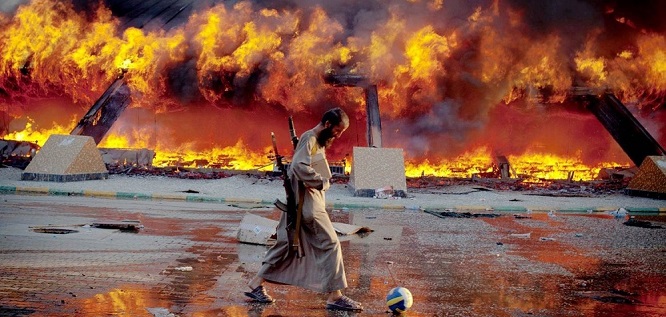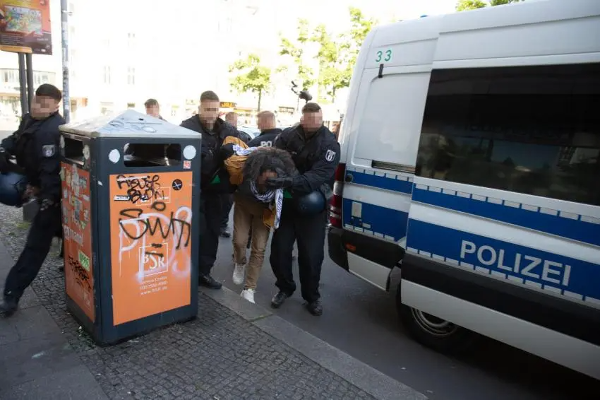With its size of about 1.8 million square meters and a population of nearly 6 million, Libya is a resource-rich country that attracts attention of other energy-conscious countries.
The Libyans rose against the country's former dictator Colonel Muammar Gaddafi in 2011 to protest the state's lack of democratic structure, the ruler's authoritarianism, economic corruption, and very importantly a decline to distribute the wealth fairly. When the nation revolted against Gaddafi, it had clues from Egypt and Tunisia, where the people toppled despots.
Libya suffered from crisis as Gaddafi put down with an iron fist the protests that called him to leave power, and NATO intervened militarily under the United Nations Security Council's resolution 1970 that cleared the way for military campaign in the uprising-hit nation. The Libyan ruler was finally overthrown and killed after 9 months. His death marked his regime's end but the plight of Libya continued to date after six years of civil war that led to rise of separate ruling units in different parts of the country.
When Gaddafi forces crushed the rallies in the initial days, armed confrontation ensued. Civil encounter urged foreign intervention that was authorized by the UNSC resolution that offered support for the anti-regime rebels.
The NATO mission in Libya ranged from establishing a no-fly zone over the crisis-hit country to preventing Gaddafi jets from bombing the opposition-held areas to a bombing campaign that largely stripped the colonel of his air, sea, and ground forces and finally led to his government's collapse.
Gaddafi government was toppled, but questions remain about the measures of NATO during its campaign. The North Atlantic Treaty Organization was tough in its bombardment and despite its ostensibly humanitarian intention of intervention, it heavily destroyed the country's infrastructure. The coalition also failed to arrange for the post-war period by disregarding Libya's internal potentials for further clashes and so contributed to further innocent people's deaths and complicated conditions.
Gaddafi regime's collapse brought about power vacuum as the country fell to the rebels who clashed over power. Tripoli, the capital, and Benghazi, a popular anti-Gaddafi protest city, after Gaddafi become the strongholds of two major opposite political camps. Several attempts to form a national unity government proved a failure. The country went to parliamentary elections twice, in 2011 and 2014, but failed to attract considerable voters, and so the political scene failed to see peaceful competition. Not surprisingly, apparently resorting to the front lines remained a desired option for various Libyan parties.
Here is a picture of how the status of the Libyan political forces looks like:
1. The Government of National Accord of Libya, led by Prime Minister Fayez al-Sarraj, was formed following an agreement reached between the Tobruk Parliament and the Tripoli-based General National Congress and has the UN and the US backing.
2. The Libyan National Army under command of army officer Khalifa Haftar is based in east of the country. The LNA so far declined to hold peace talks with the west-backed national unity government. The military leader so far tried to engage in strategic relations with the US and France. Russia supports the strongman in the face of terrorist groups in the country.
3. There are Islamist groups like Muslim Brotherhood and Fajr Libya militias that are supported by Turkey and Qatar.
4. ISIS for some time seized Sirte and Darnah port cities in eastern Libya, but is now being defeated as a Haftar-led campaign against it is underway.
Libya and political actors
Here is a list of domestic and foreign political actors that each has a share in the country's politics.
1. Domestic actors: Gaddafi government's remnants and loyalists, Muslim Brotherhood, seculars, Salafis, and radical groups. Multi-fronted conflict between these sides prevents them from agreeing an effective national unity government to curb the broadening crisis in the country.
2. Regional actors: Egypt, Saudi Arabia, Turkey, and Qatar each back sides in Libya by supplying arms when Gaddafi fell, mainly in quest of their own interests. Saudi Arabia, for instance, seeks to build a base for the Salafis in the Libyan society to help promote Salafi ideology. Others like Qatar and Turkey seek getting a toehold in the war-devastated country through strengthening Muslim Brotherhood there. Egypt, on the other side, wants radical Islamists to take the power instead of the Muslim Brotherhood, which it brands a terrorist group at home. Destructive role of these regional actors so far even compounded the difficulties and made the country head to partition.
3. Global actors: NATO, the US, the EU, Italy, and France are leading international sides of the Libyan crisis. Rich natural resources are main drives behind these parties' intervention in Libya. The US wants to break Libya in smaller states, a scheme that brings the country's rich eastern oilfields under Washington's control. In fact, the West views Libyan crisis as an opportunity in terms of energy supply. Libya's closeness to the Mediterranean makes it easy and faster to the West to transfer oil to its ports. This is advantage, according to the experts, was the main motivation for the West's anti-Gaddafi campaign upon revolution eruption. During his presidential campaign Donald Trump admitted that the US and NATO were behind Libya's chaos, adding that his country should do something to get rid of ISIS in Libya.
"You can make the case, if you look at Libya, look at what we did there - it's a mess", Trump told NBC news.
2011 figures suggested that Libya with 47-billion barrels oil reserve is the ninth largest oil-rich nation.
Trump, talking to the Wall Street Journal in 2011, said that the US should support the Libyan rebels provided that they give it half of their oil. He added that even in old times the winners got the "spoils."
Walid Phares, the US foreign policy advisor, earlier said that Trump supported the Libyan National Army, Haftar, and the elected parliament. All in all, Trump Libya policy's focus has so far been on containing the terrorists and backing the liberals of the Government of National Accord.
Many analysts argue that the Libyan crisis is a Western plot aided by the Arab countries and has no intention other than fully destroying the North African country. They assert that NATO members, especially France tore Libya down and helped the Israeli regime's influence expand across Africa, while the Arabs are still trapped in the West's colonial plots.
What are current Libya challenges?
1. Refugee crisis is an essential challenge now for Libya. 3.5 million out of the 6 million Libyans are now displaced and seeking asylum in Europe for better living conditions.
2. Widespread terrorism crisis is another problem the war brought not only to Libya but also to the region and the world. This is a major threat to Europe now. ISIS branch in Libya declared existence in 2014. The Libyan Foreign Minister Mohamed Taha Siala maintained that heavy blows to the terrorists in Syria and Iraq will push them to choose Libya as their backyard. A major part of Libya's territories are now held by ISIS which is present in Tripoli, Benghazi, and Sirte.
3. Energy wealth of Libya is now a source of trouble as it draws global powers' intervention. Western powers are in a race for bigger share from the country's oil.
4. Domestic divisions and low oil prices now risk Libya's full financial collapse.
5. Another challenge is risks of partition that appears to be an American intention since its initial intervention, though smaller Libyan governing units contribute to terrorism spread that can make its way to Egypt and Tunisia, and even challenge the European security.
Now a host of Libyan sides, backed by foreign parties, fight each other for bigger share from power. They seek foreign support for an upper hand in the battle. Khalifa Haftar in early July visited the UAE and Russia to convince them to supply him with weapons as part of efforts to tighten grip on power in eastern Libya.
Growing internal conflicts, regional developments, rich oil reserves that account for half of Africa oil reserves, and proximity to the Mediterranean Sea add to risks of Libya partition amid Arab and Western game in the chaos-hit nation.
LINK: https://www.ansarpress.com/english/7659
TAGS:































 Violation of the sovereignty and rights of afghan citizens by America
Violation of the sovereignty and rights of afghan citizens by America




